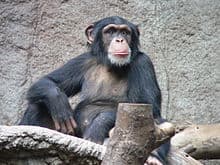The ability of male chimpanzees to form coalitions with one another in order to direct aggression at other male chimpanzees has certain benefits.
A new study by Ian Gilby at Duke University in North Carolina and his colleagues has further revealed that it may not just be the coalition that is important, but who the coalition is with that determines future success. Their study finds that male chimpanzees with central positions in the coalitionary network were most likely to father offspring and increase in rank. Specifically, those who formed coalitions with males who did not form coalitions with each other were the most successful. Their work is published in the Springer journal Behavioral Ecology and Sociobiology.
 Coalitionary aggression is when at least two individuals jointly direct aggression at one or more targets. Aggression and coalition formation between males is important for attaining a higher dominance in many animal species. The most dominant males are more likely to mate and therefore, sire offspring. Males with high coalition rates are more likely to mate more often than expected for their rank.
Coalitionary aggression is when at least two individuals jointly direct aggression at one or more targets. Aggression and coalition formation between males is important for attaining a higher dominance in many animal species. The most dominant males are more likely to mate and therefore, sire offspring. Males with high coalition rates are more likely to mate more often than expected for their rank.
Gilby and his colleagues studied data from wild chimpanzees gathered over 14 years from the Kasekela community in Gombe National Park in Tanzania. They wanted to test the hypothesis that male coalitionary aggression leads to positive benefits via increased dominance rank and improved reproductive success. Of the four measures they used to characterize a male’s coalitionary behavior, the only one that was related to both of these factors was ‘betweenness’ – a measure of social network centrality – which reflects the tendency to make coalitions with other males who did not form coalitions with each other. The only non-alpha males to sire offspring were males that had the highest ‘betweenness’ scores. These males were also more likely to increase in rank, which is associated with higher reproductive success.
The researchers postulate that this shows that male chimpanzees may recognize the value of making the ‘right’ social connections. By choosing their coalition partners carefully, they are demonstrating an ability to recognize the relationships of others.
The authors conclude that “…our data suggest that there are consequences to the recognition of third party relationships. As such, it represents an important step toward a more complete understanding of the adaptive value of social intelligence and the evolution of co-operation.” They add that further observation is required to fully explain the study’s findings.
Reference:
Gilby IC, Brent LJN, Wroblewski EE, Rudicell RS, Hahn BH, Goodall J and Pusey AE (2012). Fitness benefits of coalitionary aggression in male chimpanzees. Behavioral Ecology and Sociobiology. DOI 10.1007/s00265-012-1457-6
If our reporting has informed or inspired you, please consider making a donation. Every contribution, no matter the size, empowers us to continue delivering accurate, engaging, and trustworthy science and medical news. Independent journalism requires time, effort, and resources—your support ensures we can keep uncovering the stories that matter most to you.
Join us in making knowledge accessible and impactful. Thank you for standing with us!
